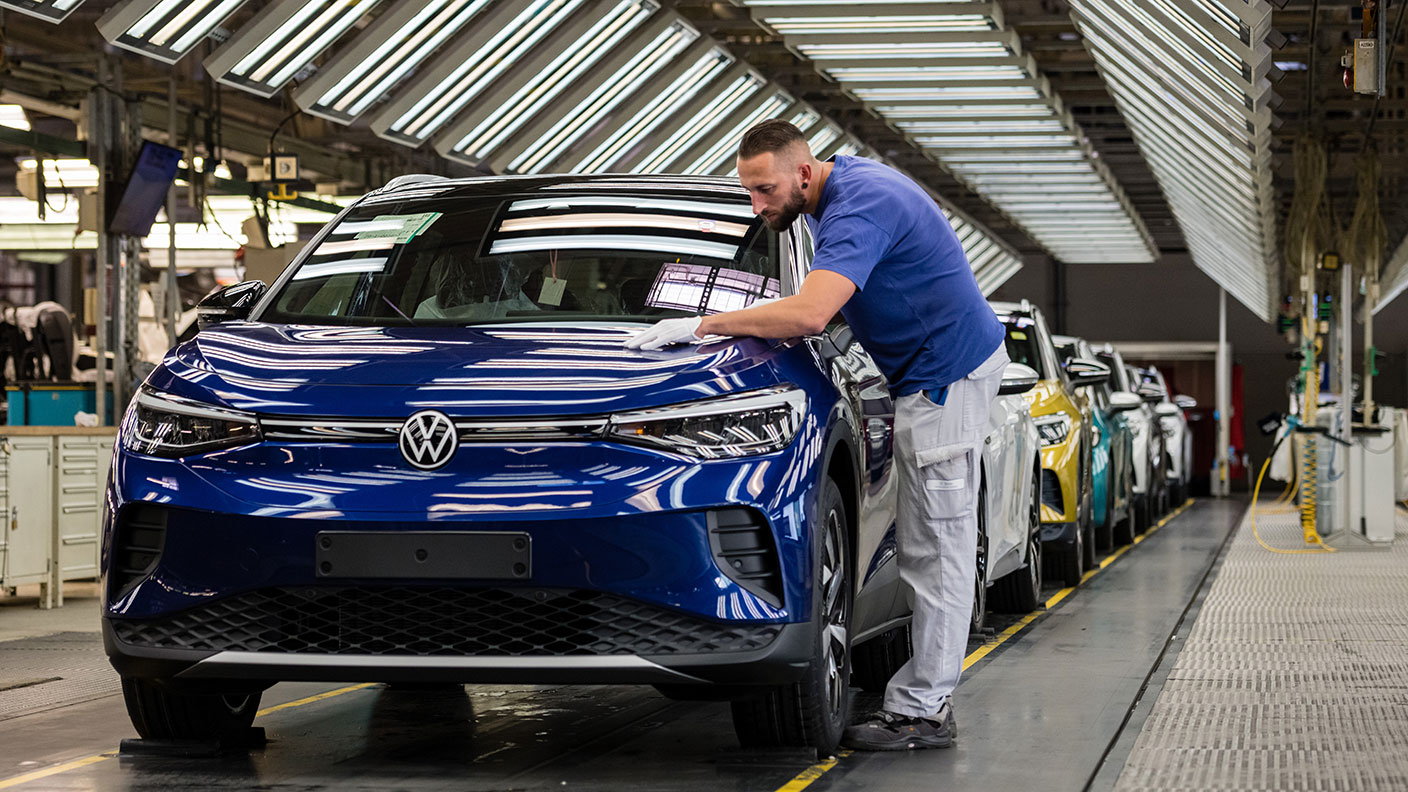Will Tesla hit $3,000, or are you better off investing elsewhere?
One of the world’s most successful fund managers believes that Tesla’s share price will hit $3,000 by 2025. Saloni Sardana examines whether that's a realistic aim, or whether you should steer clear.


Get the latest financial news, insights and expert analysis from our award-winning MoneyWeek team, to help you understand what really matters when it comes to your finances.
You are now subscribed
Your newsletter sign-up was successful
Want to add more newsletters?

Twice daily
MoneyWeek
Get the latest financial news, insights and expert analysis from our award-winning MoneyWeek team, to help you understand what really matters when it comes to your finances.

Four times a week
Look After My Bills
Sign up to our free money-saving newsletter, filled with the latest news and expert advice to help you find the best tips and deals for managing your bills. Start saving today!
Cathie Wood, one of the world’s most successful fund managers, reckons that Tesla’s share price will hit $3,000 by 2025. For perspective, it’s currently sitting at just over $650 after a bumpy start to the year. Is Wood right, or are her claims just the latest evidence that Tesla – and the wider electric vehicle sector in general – is one massive bubble waiting to collapse?
Cathie Wood’s latest emphatic endorsement of Tesla came in a report from her asset management company Ark Invest on Friday. Tesla’s share price reacted as you might expect, jumping by as much as 6% on Monday this week.
Wood is very much in favour at the moment, having made huge returns for investors in recent years. Ark has proved very successful with its range of seven thematic exchange-traded funds (ETFs) – stockmarket-listed funds set up to take advantage of a specific sector or theme. In Ark’s case, it specialises in making aggressive bets on growth stocks, and that of course has paid off handsomely over recent years. So it’s no surprise that Tesla is the top holding across all of Ark Invest’s funds.
MoneyWeek
Subscribe to MoneyWeek today and get your first six magazine issues absolutely FREE

Sign up to Money Morning
Don't miss the latest investment and personal finances news, market analysis, plus money-saving tips with our free twice-daily newsletter
Don't miss the latest investment and personal finances news, market analysis, plus money-saving tips with our free twice-daily newsletter
Investors may also be inclined to take notice of this price target because it’s not the first time Wood has made an eye-watering-yet-accurate prediction for Tesla’s stock. In 2018, Wood made what many would have considered a wild bet – that Tesla would trade at $800 a share within five years (the target was $4,000 at the time, but Tesla went through a five-for-one stock split last August, so we’ve adjusted for that).
At the time she made the forecast, Tesla’s price (adjusted for the split) was just $250 per share. It raced past her $800 target in January this year, two years ahead of schedule. So what’s next for Tesla? Why is she so bullish?
Again, it’s all about “disruption”. Wood’s latest price target assumes (in part) that the electric car producer will launch an autonomous robot taxi service. “In preparation for its robo taxi service, Tesla could launch a human-driven ride-hail network first, delivering a highly profitable recurring revenue stream and limiting the downside of a failed autonomous service. A human-driven ride-hail service could boost Tesla’s price target in ARK’s bear case significantly”, Wood says.
Even in a worst-case scenario, Wood expects Tesla to trade at $1,400 by 2025 (ie more than doubling from here) and in the best-case scenario, sees the stock hitting $4,000. Wood has been right before, and her short-term record is excellent. Should investors pay attention to her this time around?
The entire global car market is in the grip of a “big delusion”
During 2020, several factors – from ultra-low interest rates to Tesla’s status as a bit of a “meme” stock, enthusiasm for all things electric and ESG to genuine progress in sales and manufacturing – helped drive the electric car group’s prices up by almost 700%.
So the fact that it has taken a bit of a hit since the start of this year isn’t necessarily surprising after such a strong run. However, even after the recent correction, it’s hard to argue that Tesla is a bargain. Or even priced reasonably.
Indeed, a report released earlier this month by Rob Arnott and colleagues at Research Affiliates argues that the whole electric vehicle sector is already pricing in too much optimism, never mind Wood’s $3,000 target. (The report is entitled, Big Market Delusion: Electric Vehicles, which gives you a good idea of the contents before you even get into it).
The first point they make is that by the end of January this year, the combined market capitalisation of the worldwide listed car industry grew by 70% to $2.16trn. But almost all of that gain has happened in the past year; in 2018 and 2019, traditional car makers fell in value, while electric car makers were flat.
What happened in 2020, after the market bottomed out in the wake of the pandemic, is that the share prices of electric car makers soared, even as sales for the vehicle industry as a whole fell. As a result, by the start of this year, the combined value of the traditional car manufacturers (Research Affiliates includes 37 companies here) was around $1.1trn, while the combined value of eight electric vehicle makers came in at almost as much – $1trn. And of that $1trn, Tesla alone accounted for about 75%.
Here’s the key point made by Arnott and team: for Tesla to be worth as much as it was at the start of the year (about $800 a share), it needs “to dominate the entire auto industry, not just the electric vehicle market”.
Not everyone can be a winner here
Even if you argue that the market is right to price that in, there’s a problem. Because if Tesla does end up dominating, the value of its direct competitors – all the other car manufacturers, both electric and traditional – should be falling to reflect this dominance. Instead, prices of all other electric vehicle groups have soared – as Arnott says, “the pricing delusion is not exclusive to Tesla” – and even traditional car manufacturers have risen, helped by their own electric-vehicle plans.
For example, German car manufacturer Volkswagen last week announced plans to build six electric-vehicle battery factories across Europe and make electric cars its main product by 2030, causing its shares to rally. VW said it plans to overtake Tesla as the leading manufacturer. Ford and General Motors have also witnessed higher prices after they merely showed greater willingness to participate in the electric vehicle sector.
What’s going on? Investors see an exciting new market, and they are just throwing money at it as if every company will be a winner, which clearly isn’t possible. In short, as Arnott puts it: “The hallmark of a big market delusion is when all the firms in an evolving industry rise together even though they are often direct competitors.”
The point is that electric cars may very well be the future. But at current levels, it’s already priced in and more. That’s why bulls on Tesla still need to rely on “jam tomorrow” stories – like robotaxis – to justify their ever-increasing valuations.
That’s worked while growth stocks have been in the ascendant and interest rates and inflation have remained low, for reasons we’ve discussed previously. But now the pendulum is swinging back towards value stocks. It may seem a little ironic, but the best bet for investors right now might not be electric cars, but the fossil fuel companies they threaten to make obsolete.
We’ll have a lot more on all of these topics in upcoming issues of MoneyWeek magazine. If you’re not already a subscriber, you can get your first six issues plus a beginner’s guide to bitcoin, absolutely free here.
Get the latest financial news, insights and expert analysis from our award-winning MoneyWeek team, to help you understand what really matters when it comes to your finances.
Saloni is a web writer for MoneyWeek focusing on personal finance and global financial markets. Her work has appeared in FTAdviser (part of the Financial Times), Business Insider and City A.M, among other publications. She holds a masters in international journalism from City, University of London.
Follow her on Twitter at @sardana_saloni
-
 Should you buy an active ETF?
Should you buy an active ETF?ETFs are often mischaracterised as passive products, but they can be a convenient way to add active management to your portfolio
-
 Power up your pension before 5 April – easy ways to save before the tax year end
Power up your pension before 5 April – easy ways to save before the tax year endWith the end of the tax year looming, pension savers currently have a window to review and maximise what’s going into their retirement funds – we look at how
-
 Key lessons from the MoneyWeek Wealth Summit 2025: focus on safety, value and growth
Key lessons from the MoneyWeek Wealth Summit 2025: focus on safety, value and growthOur annual MoneyWeek Wealth Summit featured a wide array of experts and ideas, and celebrated 25 years of MoneyWeek
-
 The Stella Show is still on the road – can Stella Li keep it that way?
The Stella Show is still on the road – can Stella Li keep it that way?Stella Li is the globe-trotting ambassador for Chinese electric-car company BYD, which has grown into a world leader. Can she keep the motor running?
-
 Tesla is no longer the world’s largest electric car maker. Should you invest?
Tesla is no longer the world’s largest electric car maker. Should you invest?Investors need to weigh up the potential of Tesla’s autonomous technology drive against struggles in its core carmaking business when deciding whether or not to invest
-
 Most popular stocks of 2023: AI on the up while interest in Netflix plummets
Most popular stocks of 2023: AI on the up while interest in Netflix plummetsWe reveal the most popular shares of 2023 so far.
-
 Is it different this time for Japanese stocks?
Is it different this time for Japanese stocks?Analysis Nikkei 225 Index has jumped 19.8% this year, and there are signs the rally could continue.
-
 As China reopens, why pick an income strategy?
As China reopens, why pick an income strategy?Advertisement Feature Yoojeong Oh, Investment Manager, abrdn Asian Income Fund Limited
-
 Is Japan the best market to invest in now?
Is Japan the best market to invest in now?Opinion Japan puts Western economies to shame and offers good value for both equity and bond investors, says Max King.
-
 The highest yielding S&P 500 Dividend Aristocrats
The highest yielding S&P 500 Dividend AristocratsTips Dividends are a key component of investment returns in the long-term. A portfolio of dividend aristocrats is a great way to build wealth and a sustainable income stream.
